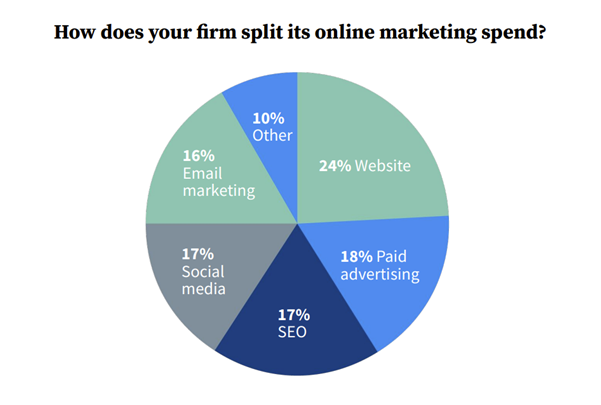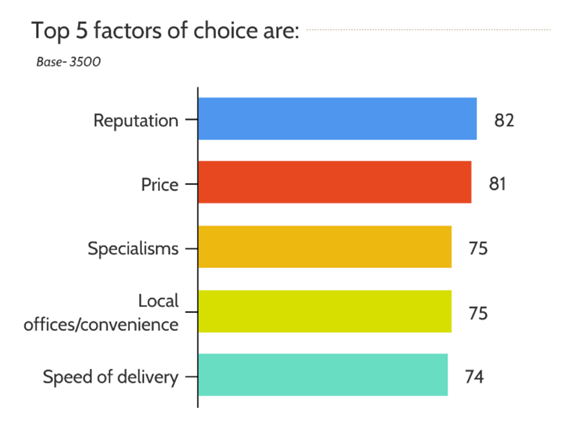GUIDES
Digital marketing for law firms in 2023
Law firms need to have a strong online presence in order to stay competitive and relevant in the marketplace, and that’s where digital marketing comes in.

Guide to legal marketing
Do law firms need digital marketing?
In this digital marketing guide tailored for law firms in 2023 we emphasise the importance of leveraging various digital channels to maximise your firm’s online visibility.
From search engine optimisation (SEO) to email marketing, digital marketing can help law firms reach a wider audience, increase traffic to their website, build brand awareness, and generate more of the right clients.
It’s not enough for law firms to rely on word-of-mouth referrals and traditional advertising methods to attract new clients in 2023. Many people now turn to the internet to find solutions to their problems, including legal services. In fact, 96% of consumers looking for legal services will now use a search engine.
Not only does digital marketing allow law firms to connect with prospective clients in a way that traditional marketing methods cannot match, but it also offers a more cost-effective and measurable way to track the success of your marketing efforts.
In this comprehensive guide, we will explore all aspects of digital marketing for law firms – including best practices for the likes of SEO and content marketing – and how law firms can greatly benefit from implementing these tactics into their growth strategy.
The legal marketing experts at MLT will provide you with the knowledge and tools you need to take your digital marketing efforts to the next level and grow your practice in today’s competitive online landscape.
What are the first steps to marketing your law firm?
The first three critical steps a law firm should take to ensure their marketing efforts are effective and efficient are:
Successfully addressing all three points will set you up for success as you move forward with your marketing plan.
Define your law firm’s target audience
To create a powerful marketing strategy for your law firm, you have to first define your target audience. Understanding who you are trying to reach will help you tailor your marketing efforts to their needs and preferences.
Some questions to consider when defining your target audience include:
What type of legal services do you offer?
We recommend listing all of your legal services and sorting them from most to least desirable types of work – this lets you focus your attention on the practice area that works best for you.
Who are the ideal clients for your practice?
It’s understandable to want to cast the net wide to attract as many potential clients as possible, however, the more specific your marketing can be for your target audience, the more likely it is to be successful.
What demographic information do you have about your current clients?
This may include details such as age, location, gender, and job title.
What problems or pain points do your clients have that you can solve?
When you determine what your ideal customer's pain points are, you can address how your law firm can solve them within your marketing.
Set marketing goals
Once you’ve defined your target audience, you need to think about what you want to achieve through your marketing.
Some common goals for law firms include:
Boost social media engagement
Establish your law firm as a thought-leader
Setting specific and measurable goals let you track your progress and adjust your marketing strategy as needed.
Your law firm marketing budget
Without a clear idea of what you’re willing to invest in your law firm’s marketing, it can be difficult to create a plan that meets your goals and stays within your financial means.
During times of business stress, marketing budgets are usually among the first to be cut because they are often viewed as non-essential costs.
The 2008 recession, Covid-19 and subsequent lockdown, and the latest cost of living crisis, are some good examples.
Cost cutting when times are tough isn’t unreasonable; everybody should do what they feel is right for their business. Marketing spend is, however, vital to ensure that there is still wind in the sails when the storm passes.
The wind, in this case, is a steady flow of new business enquiries.
For many firms, the right marketing support has enabled them to focus on practice areas and services that are more resilient to negative trading conditions.
Some of the latest legal marketing statistics have highlighted that marketing budgets for law firms aren’t going away anytime soon.
The ‘2022 Marketing Outlook for Law Firms’ report by CallRail found that firms are allocating approximately 49% of their annual budget towards marketing.

Of those surveyed, the most popular channels their marketing budget was allocated to was their law firm website and paid advertising.
When determining your marketing budget, it’s important to strike a balance between investing enough to achieve your desired results while still being mindful of your financial resources.
By taking the time to evaluate your current financial situation, business goals, and market competition, you can establish a budget that works for your law firm and maximises the return on your investment (ROI).
Remember, setting a budget is not a one-time task – it’s an ongoing process that requires monitoring and adjusting to ensure your online marketing continues to deliver results.
If you need assistance with where to focus your law firm’s marketing efforts in 2023, call us on 0333 344 2722 and we can discuss the most suitable and profitable route forward.
Evaluating your current marketing efforts
Before making any changes to your marketing strategy, it’s important to evaluate your current efforts. In this section, we’ll explore how to analyse your website’s UX, check your online reputation, and performance tools to use.
By understanding where you currently stand (what’s working well and what’s not), you can make informed decisions about how to improve your law firm’s marketing strategy.
Analyse your law firm’s website UX
Your law firm’s website is the foundation of your online presence. It’s the first place potential clients will look when searching for legal services.
To ensure that your website is working effectively as a marketing tool, you need to review it regularly. Here are some key areas to focus on:
Usability
Is your website easy to navigate? Can users find the information they need quickly?
Design
Is your website visually appealing? Does it accurately represent your law firm's brand?
Content
Is your website's content high-quality and relevant to your ideal client?
Performance
Is your website loading quickly? Are there any technical issues that need to be fixed?
Conversion optimisation
Is your website effectively converting visitors into leads and clients?
By regularly analysing your website, you can identify areas for improvement and make changes that will help you attract and retain more clients.
Check your online reputation
In today’s digital age, your law firm’s online reputation is critical to its success. In fact, 82% of legal services consumers felt reputation was important when choosing a provider.
Legal services consumers are now shopping around more before choosing a provider, up 13% since 2021, meaning your law firm needs to stand out. When asked, consumers said that ‘reputation’ was the most important factor for choosing a lawyer, over ‘price’ and ‘specialism’.

As such, ensuring your online reputation is visible for all prospective clients is of the utmost importance. Gaining the knowledge of a specialist legal marketing agency can dramatically boost your law firm’s reputation.
Contact us today to find out more.
Online reviews for your law firm
To ensure that your online reputation is strong, your first focus should be to check your online reviews.
Online reviews are now the gold standard indicator of trust. If your firm is already asking happy clients to leave Google reviews for you, hopefully this has led to five stars appearing beside your name in the search engine results page (SERPs).
This in turn will lead to an increase in click through rates to your site and hopefully more enquiries.
Whilst positive Google reviews (and reviews from other sources) are great for building trust and carry positive SEO ramifications, the downside with going after reviews is that, inevitably, at some point, somebody is going to leave you a negative review.
What to do if your law firm receives a bad review
Here are the steps to take if your law firm receives a bad review online:
- Identify if the review is real or fraudulent (yes, some people really do have nothing better to do with their time).
- If the review is fake, flag with Google.
- If the review is real, it may not be removed so don’t ignore it. You’re not responding to appease the reviewer, but to show potential clients that you are on top of these kinds of things and that you are open, transparent and confident enough to respond to customer dissatisfaction.
- If someone genuinely wasn’t satisfied with your service, then you should address their complaint and offer to take the conversation offline to attempt to find a mutually beneficial resolution.
By regularly monitoring your law firm’s online reputation, you can identify areas that need improvement and take action to address any negative feedback.
This will help you build trust with prospective clients and establish your law firm as a reputable provider of legal services.
What online marketing tools should I use?
There are many online tools that law firms can use to analyse their marketing outputs. Our top three recommended platforms are:
Tools such as those mentioned above can help you track website traffic, keyword rankings, social media engagement, identify areas for improvement and, ultimately, optimise your online marketing strategy for law firm success.
What should law firms include in their marketing strategy?
With 20+ years in the legal marketing industry, our recommended approach is to focus initially on the following ways to market your law firm online.
Branding for law firms
Branding is a critical component of any law firm’s marketing strategy. It’s the way you present your law firm to the world and, when done successfully, sets you apart from your competitors.
To create a strong brand for your law firm, you need to:
Define your brand identity
Including your law firm's mission, values, and personality.
Develop a brand strategy
Outline how you will communicate your brand to your target audience.
Create visual elements
E.g. your law firm's logo, website design, and marketing materials.
Consistent brand application across all channels
Ensure your law firm's branding is consistently presented to build trust.
Law firm content marketing
Developing a website, rich with relevant and targeted content will help you appear higher in search engines, convince clients that you are the solicitor for them, and help increase your overall number of enquiries.
This type of content attracts and converts clients by demonstrating knowledge, expertise and thought leadership in your particular practice area.
Content marketing for law firms can take many forms, including:
Blog posts and articles
Ebooks
Infographics
Podcasts
Videos
Your content marketing strategy must align with your overall business goals and should be tailored around what type of business you want to attract.
By creating high-quality content that addresses the needs, interests, and pain points of your ideal customer, you can establish your law firm as a thought-leader in your practice area.
Law firm SEO
Search engine optimisation (SEO) is the process of optimising your law firm’s website to improve its visibility in search engine results pages (SERPs). Some common SEO techniques for law firms include:
Keyword research
Identifying the keywords and phrases your target audience is searching for to improve your chances of being found online.
On-page optimisation
Optimising your website's content, your metadata, and URL.
Off-page optimisation
Building external links (or 'backlinks') to your law firm's website from other reputable websites is key to having a solid off-page SEO strategy.
Local SEO
Optimising your law firm's website for local search queries through your Google Business Profile and local directory listings.
To find out more, check out our in-depth ‘Ultimate guide to SEO for law firms in 2023′ or our ‘Guide to local SEO.’
Challenges of law firm marketing
Marketing a law firm comes with a unique set of challenges that must be addressed to ensure success. Some of the most common challenges we’ve heard over the years have been:
Below, we outline three key steps to overcome each of these law firm marketing challenges.
Call handling for law firms
Many law firms struggle with call handling, leading to lost business (an average of 46 clients each year because of slow response times). Our top tips for having a successful call handling strategy for your law firm are:
Answer quickly
In 2022, 34% of law firms said they answered calls via an automated service. Letting the phone ring out isn’t going to create that all important positive first impression. A phone call is typically the first touchpoint a prospective client has with your business so make sure you answer the phone quickly!
Train your staff
Ensure that everyone who answers the phone at your law firm is trained in proper call handling techniques.
Use a script
A script ensures that every potential instructing agent that calls your law firm will get the same response no matter who picks up the phone. Consistency is important to ensure that all potential clients have a similar, positive, experience with your law firm.
To find out more about how to handle enquiries and follow up with prospects, read our insights piece here.
Marketing costs
Most law firms don’t have the budget available to create an in-house marketing team and, as a result, often a partner within the firm is given the role of ‘marketing partner’.
For this partner, it can be a nightmare juggling fee earning duties and coming up with a number of ‘marketing activities’ designed to grow the turnover of the firm.
To keep costs low for your marketing efforts, you can:
Identify cost-effective strategies
For example, online content marketing is much more budget-friendly than traditional advertising.
Prioritise marketing spending
Determine which marketing strategies are most effective for your law firm and allocate more of your budget accordingly.
Outsource
Consider outsourcing your marketing to a third-party provider to save your law firm's time and resources.
Measuring return on investment (ROI)
Measuring the return on investment (ROI) of your law firm’s marketing efforts can be challenging. To figure out how much money your law firm can make from the internet, you must:
Calculate your ROI
Before launching any marketing campaign, you need to understand your ROI. We will be releasing our free ROI calculator for law firms in the near future so keep your eyes peeled!
Track metrics
Tools such as Google Analytics can help you measure metrics such as website traffic, qualified leads, and conversion.
Evaluate and adjust
Routinely review your marketing metrics and adjust your strategy as necessary to improve ROI.
In-house vs outsourcing marketing for lawyers
When it comes to handling your marketing strategy, one question will supersede all others – should I:
Do it myself
Unless you’ve recently become a lawyer after finishing a career as website designer and SEO specialist, we recommend you avoid this option. Even if you have, we would suggest you deploy your experience to manage someone else carrying out this work for you. You may opt for an in-house team so your marketing resource is on site, for example.
Over the last few years, we have noticed a rise in law firms with in-house digital marketing support. For us as a legal marketing agency, it is great to see law firms recognising the value and importance of specialist digital marketing support.
Hire a specialist
There are pros and cons with hiring a specialist to handle your law firm’s marketing strategy. If your strategy is strong overall but lacking in one specific area (such as PPC), then hiring a PPC specialist would be a great advantage to your marketing output.
On the other hand, it’s highly unlikely that you will be able to find one person with a wide enough skillset to manage the multifaceted aspects of an entire digital marketing campaign. The skills to execute a full marketing strategy would typically include:
- Website build and design
- Technical and IT support
- Content marketing
- Search engine optimisation (SEO)
- Social media marketing
- Paid advertising
In cases where you are looking for a complete digital marketing strategy for your law firm, it is worth considering outsourcing to a specialist agency.
Outsource it to another agency
According to CallRail’s 2022 report, 83% of firms are now outsourcing their marketing work, with 61% hiring the help of an agency. Some advantages to outsourcing to a legal marketing agency include:
- Agency relationships are performance-based and accountable to results
- Agencies need to remain at the leading edge of technology and tactics to remain competitive
- An agency resource should be flexible and scalable to suit your changing needs
- Agency spend gives you access to a team of marketers for a fraction of the cost of building a team in-house
The reality is, when considering in-housing versus outsourcing your marketing, there is no right or wrong answer. You need what’s best for your law firm.
We hope you enjoyed this guide to digital marketing for law firms.
The digital landscape holds enormous potential, and with a comprehensive digital marketing strategy, law firms will thrive and achieve their business goals.
DIGITAL MARKETING SERVICES TO HELP LAW FIRMS GROW ONLINE IN 2023
Bespoke digital marketing strategies to help law firms grow in 2023
If you’d like to have a free consultation with our legal marketing experts about generating consistent leads for your law firm, reach out via the phone number 0333 344 2722 or click below and we’ll get back to you right away.